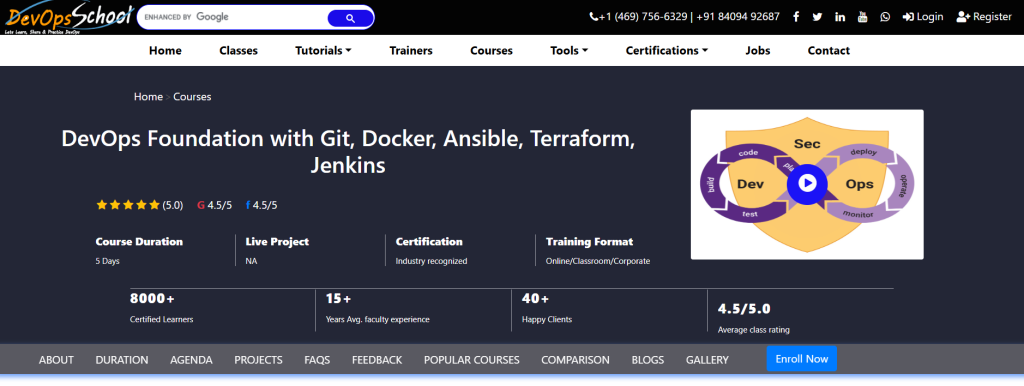
Certification Provider: DevOpsSchool
Trainer: Rajesh Kumar
Introduction to DevOps Foundation Certification
- Overview: Introduction to DevOps, its role in modern IT, and how this foundation course builds a solid understanding of essential DevOps tools and practices.
- Purpose of the Certification: Designed for professionals to gain expertise in DevOps methodologies and toolsets, including Git, Docker, Ansible, Terraform, and Jenkins.
- Target Audience: Ideal for software engineers, IT operations, DevOps enthusiasts, and anyone aiming to adopt DevOps principles in their organization.
Learning Objectives
- Understand the core principles of DevOps and its lifecycle stages.
- Learn the basics of version control with Git and its role in CI/CD workflows.
- Gain foundational skills in containerization using Docker.
- Master infrastructure automation with Ansible and Terraform.
- Understand CI/CD pipeline automation using Jenkins.
Instructor-led, Live & Interactive Sessions
| Duration | Mode | Level | Batches | Course Price at |
|---|---|---|---|---|
| 8 to 12 Hrs. (Approx) | Online (Instructor-led) | Advance | Public batch | ₹24,999/- [Enroll Now] |
| 8 to 12 Hrs. (Approx) | Videos (Self Learning) | Advance | Public batch | ₹4,999/- [Enroll Now] |
| 5 Days | Corporate (Online/Classroom) | DevOps Foundation with Git, Docker, Ansible, Terraform, Jenkins | Corporate Batch | Contact Us |
Agenda of the DevOps Foundation Certification Course
| Day | Topics |
|---|---|
| Day 1 | Introduction to DevOps – DevOps overview, principles, and culture DevOps Principles and Practices – Lifecycle stages, CI/CD basics Git Introduction and Basics – Version control essentials, setting up Git, repositories, commits, branching Advanced Git – Branching strategies, best practices, Git in CI/CD, handling conflicts Git Integration and Automation – Integrating Git with CI/CD, automated testing, deployment practices |
| Day 2 | Introduction to Docker – Docker architecture and setup Docker Images and Containers – Creating images, running containers, essential commands Docker Compose – Multi-container applications using Docker Compose Docker Networking and Volumes – Networking concepts and data management Best Practices – Docker best practices and common pitfalls |
| Day 3 | Introduction to Ansible – Understanding Ansible and its components Setting Up Ansible – Installation, configuration, and host file setup Ansible Playbooks – Writing and executing simple playbooks Running Ansible Commands – Command-line options and basic management Best Practices – Ansible best practices and avoiding common issues |
| Day 4 | Introduction to Terraform – Understanding Terraform and its terminology Creating and Managing Infrastructure – Writing configuration files, initializing, and applying configurations Provisioning Resources – Defining resources, using variables, and managing state Terraform Best Practices – Coding guidelines and common pitfalls |
| Day 5 | Introduction to Jenkins – Jenkins concepts and setup Creating Jenkins Jobs – Building a freestyle project and configuring Git Jenkins Pipeline Fundamentals – Creating and configuring Jenkins pipelines Jenkins Plugins – Installing and using plugins for extended functionality Best Practices – Jenkins best practices and error prevention |
Key Benefits of Certification
- Industry Recognition: Validate your DevOps skills with a respected certification.
- Hands-On Learning: Practice with real-world tools and practical exercises.
- Career Growth: Strengthen your resume for roles in DevOps, automation, and cloud infrastructure.
- Expert Guidance: Learn from Rajesh Kumar, a seasoned expert in DevOps.
Certification Exam Details
- Exam Format: Multiple-choice questions
- Questions: 60
- Duration: 90 minutes
- Passing Score: 70%
- Exam Mode: Online, proctored
- Prerequisites: No strict prerequisites, but basic DevOps knowledge is beneficial.
Preparation Tips
- Review Course Material: Study all essential concepts and tools covered in the course.
- Engage in Hands-On Labs: Practical experience with tools like Git, Docker, Ansible, Terraform, and Jenkins is crucial.
- Participate in Study Groups: Collaborate with peers to clarify doubts and enhance learning.
- Additional Resources: Explore books, articles, and online tutorials for in-depth understanding.
How to Enroll
- Visit the official DevOpsSchool website.
- Find the DevOps Foundation Certification page.
- Select the preferred batch and schedule.
- Register and begin your DevOps journey.
About Rajesh Kumar
Rajesh Kumar, an authority in DevOps, Cloud Computing, and Automation, has a rich history of training professionals. His courses emphasize practical, hands-on learning, making complex concepts accessible and actionable.
Conclusion
The DevOps Foundation certification is an excellent starting point for mastering essential DevOps tools and methodologies. This course not only equips you with foundational knowledge but also prepares you to apply DevOps practices in real-world environments. Enroll today and take the first step toward a successful DevOps career!